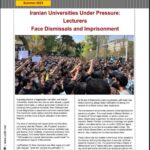
Reza Shahabi, a well respected member of the Union of Workers of Tehran and Suburbs Bus Company (SWTSBC) executive committee, has been re-arrested by the security forces in Iran. Reza Shahabi was originally arrested in June 2010 and sentenced to five years imprisonment for engaging in legitimate trade union activities.
Reza Shahabi sustained serious injuries to his back and neck as a result of violence meted out by the security forces during his arrest and long intolerable interrogations. On three occasions, he resorted to hunger strike after being refused specialist medical care outside prison. He was finally moved to hospital as a result of his serious medical conditions, compounded by the hunger strikes, and underwent two operations on his back and neck.
Considering his original sentence and the fact that he had spent months on medical leave for treatment, which should have been seen as running concurrently with the sentence, Shahabi’s time should have been deemed to be served. He should therefore have been due for release. However, he was recently summoned to report back to the prison authorities. The SWTSBC and Shahabi’s family had assumed that this was for him to be officially notified of his release. Instead he was re-arrested.
According to the statement of the prosecutor’s office, made out to Reza Shahabi’s wife, his imprisonment must continue until 8th January 2019.
Despite the fact that medical leave is considered as part of the prison term, the prosecutor’s office has recorded the five months of Shahabi’s medical leave as absence without prior authorisation, even though it had previously been approved by the coroner’s office, responsible for the granting of such leave in Iran. In addition, while serving his prison sentence, a new case was filed against him and the court sentenced Shahabi to another one year in jail, to run immediately consecutive to the first term. Hence the claim that Shahabi has to remain in prison for another year and five months until 8th January 2019.
The sequence of events as outined in a statement by the SWTSBC indicates that the authorities never had any real intention of releasing Shahabi. The Tehran Prosecutor apparently insisted on Shahabi’s return, despite the official coroner’s approval of his remaining on medical leave for the rest of his prison term. When Shahabi returned to Rajai Shahr Prison on the 8th August, the prison authorities told him that “your release letter is in your files. Come back to the prison tomorrow morning and collect your personal belongings”.
On the morning of 9th August, Shahabi, along with his wife and a member of the SWTSBC, went to Rajai Shahr Prison to collect his belongings. Although he himself witnessed the letter of his release, dated 15 September 2015, he was taken into the prison on the premise that he had been on an unapproved absence since 2014.
The re-arrest of Reza Shahabi is the latest in a long line of attempts by the Iranian regime to intimidate trade union activists. Other examples include the ongoing detentions of Ismail Abdi and Mohsen Omrani of the Iranian Teachers Trade Association. Shahpour Ehsaniraad, a member of the Iranian Workers’ Free Trade Union, was recently sentenced to the medieval punishment of lashing. The intensification of pressure on political prisoners in Gohardasht has led 12 of them to begin a hunger strike. These actions are all testament to the intensified atmosphere of repression and intimidation imposed by the regime.
The SWTSBC has condemned the actions of the Prosecutor in returning Reza Shahabi to prison and demands his unconditional release, together with the revocation of the prison sentences of Ebrahim Madadi and Davoud Razavi, the other two other members of the Executive Committee of the syndicate and other detained worker and teachers.
CODIR calls for an end to all repressive measures taken by the theocratic regime in Iran against independent trade unions in Iran and their members. CODIR further calls on the Iranian authorities to sign and implement ILO Conventions 87 and 98, which concern the freedom of workers to join trade unions of their choice and engage in trade union activities respectively.













 Posted in
Posted in 











